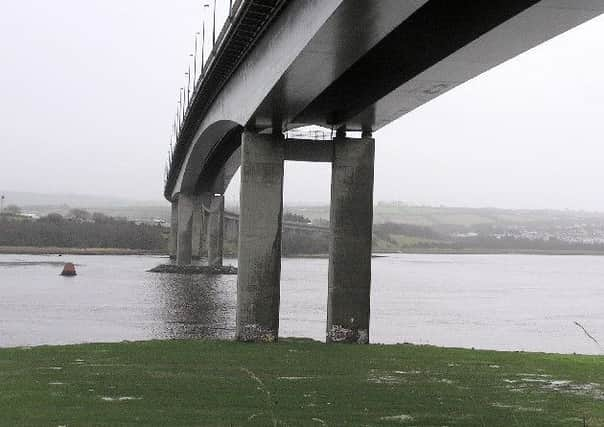Higher Foyle Bridge suicide prevention barriers ruled out due to prohibitive cost


Robin Cuddy, a senior engineer at TransportNI’s structures section, recently wrote to a local youth worker and explained how raising the barriers would require extensive works that simply weren’t affordable.
Mr. Cuddy, in correspondence with Paul Hughes of the Enagh Youth Forum, wrote that the erection of higher guard rails - the ones on the bridge are currently 20 centimetres lower than recommended under EU safety rules - have been considered by multiple agencies charged with overseeing suicide prevention in Derry since 2009.
Advertisement
Hide AdAdvertisement
Hide AdHe wrote: “There have been a number of inter-agency initiatives, dating back as far as 2009, established to consider how best to address suicide prevention on the Foyle Bridge.
“Some of these initiatives did consider raising the guard rail as requested in your e-mail.
“However none of the studies to date have established that the bridge, which was designed as a thin metal structure, could actually sustain the associated loadings imposed upon it by a higher barrier.
“The costs involved in providing a physical restraint to prevent suicide far exceed the cost of replacing the guard rail alone and would include engineering testing, including wind tunnel testing, substantive bridge assessment/design along with the construction costs to carry out any modifications deemed necessary.
Advertisement
Hide AdAdvertisement
Hide Ad“Lesser cost alternatives were considered through the inter-agency initiatives including deterrents such as CCTV, Telephones and ‘Samaritan’ style signage.
Mr. Cuddy said the recent installation of eight CCTV cameras, and increased monitoring and patrolling by the PSNI and Foyle Search and Rescue would help to act as a deterrent against suicide.
Mr. Hughes said he recognised that raising the barrier on the Foyle Bridge alone would not stop suicide but suggested it would “prevent the anguish of families looking for their loved ones in the river”.
He said: “We would call on all elected representatives to come together and make a more concerted effort to tackle suicide on the Foyle Bridge and cost is irrelevant when you are talking about saving lives.
Advertisement
Hide AdAdvertisement
Hide Ad“Enagh Youth Forum would also call for a massive investment programme in mental health and support services and the onus is on our elected representatives to get their act together and deliver.”
Last year the former Health Minister Simon Hamilton explained that while a Public Health Agency (PHA) technical options report completed in 2011 concluded that the “only viable safety option, in respect of suicide prevention, was to raise the barriers on the bridge”, it would cost “in the region of £4m to £5m, but would require additional technical testing to determine whether the bridge could support the extra weight”.
“The Department for Regional Development [now Infrastructure] agreed that the additional technical exploratory work was necessary but advised that it was not in a position to fund this work,” said the former Health Minister.
The Lifeline helpline is open 24 hours a day, every day of the year.
Advertisement
Hide AdAdvertisement
Hide AdAnyone of any age living in the North can call the Lifeline helpline for free on 0808 808 8000 if they are experiencing distress or despair.
At Lifeline you can talk to a professionally trained counsellor who will listen, give help and support, in confidence.